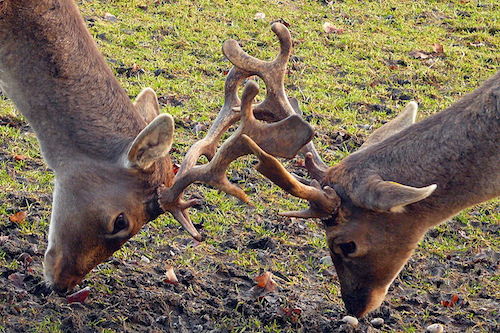 Culture & Ethics
Culture & Ethics
"Political" Animals: Just More Rights Nonsense

Words lose their meaning. Definitions are blurred. Nothing can really be discussed.
The latest example? University professor (of course!) Justin E.H. Smith’s claim that animals are part of the political community.
First, Smith asserts that animals have their own forms of politics. Well, bucks do cross antlers to decide who gets to enjoy the does — war being politics by other means. And there is no doubt that animals can act in concert. The question of whether that is "political," let’s leave to another day.
But Smith’s larger point is that animals are joined with us in a political community. From "We Are Not the Only Political Animals":
But there is another way of understanding animals as political that even the most defiant human-exceptionalist cannot dispute: not as separated out into their own discrete political societies, each according to its kind, but rather as part of a single, global political formation that includes, notably but not exclusively, human beings.
"Defiant" human exceptionalist? Belief in HE is rational and common-sensical.
But what does Smith mean by this nonsensical assertion? As far as I can tell, he means that we have duties toward animals — a core principle of the very human exceptionalism that Smith apparently rejects!
In their groundbreaking 2011 book, Zoopolis: A Political Theory of Animal Rights, Sue Donaldson and Will Kymlicka argue compellingly that animal rights theory has been limited to the extent that it has emphasized only negative rights of animals, a category that is conceived as universal and without any distinctions of moral significance within it. They argue instead that theorists would do well to focus on relational obligations that human beings come to have to animals that figure in different ways in human society. For them, nonhuman animals belong to the polis, too.
And then Smith bizarrely conflates cause and effect:
The emergence of state structures thus seems connected not only to the rise of grain storage, and therefore also of private property and of social inequality and slavery, but also to the systemic domination of certain animals by human beings. It is hard to say what exactly civilization is, but one thing seems certain: there could be no civilization without domestication.
Clearly, animal husbandry was essential to our leaving the caves. But that was because we learned to use animals as means to our own ends.
That did not make these animals part of the community. Rather, they were more like money today, not participants in the polis.
The domination of animals went together with their symbolic incorporation into human society. We know that without exception early livestock-holding societies took the animals they dominated to be absolutely central to their own social existence as human beings.
Sure, as in becoming food and clothing, as a measure of wealth — and because they had value, victims to be sacrificed to the gods. That is nothing like being part of a political or moral community.
And then the odious habit of comparing what happens with animals to the same thing if done to humans:
Manifestly, however, the ways animals figure in society, and what may be done to or with the animals representing different social categories — vermin, livestock, pets, wildlife, beasts of burden, seeing-eye dogs, and so on — mirrors the different ways in which different human groups are endowed with or deprived of their rights. Endowing and depriving different human groups of rights and resources is, in one understanding of the term, precisely what we mean when we speak of politics.
And the Holocaust!, a comparison Smith rejects before he seemingly accepts:
However, it does not insult the memory of those human beings who have been deprived of their rights and excluded from consideration as political subjects to note that, as a matter of fact, the animals that play a central role in our society are systematically excluded from the polis, from the scope of the political. Their exclusion is what makes possible the perpetuation of the system of mass slaughter as if this were not an expression of our society’s political will.
The solution to a non-problem?
Perhaps it is time to rethink the boundaries of the political.
Like how? Allow animal rights activists to have their proxy vote? Smith doesn’t say.
Gibberish. Utter nonsense. And of course, proudly published in the anti-human exceptionalist New York Times.
